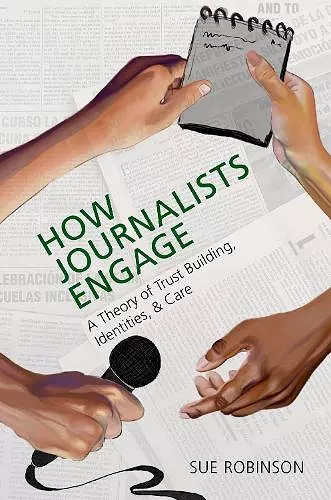How Journalists Engage
A Theory of Trust Building, Identities, and Care
Format:Hardback
Publisher:Oxford University Press Inc
Published:10th Jul '23
Currently unavailable, and unfortunately no date known when it will be back
This hardback is available in another edition too:
- Paperback£20.99(9780197667125)

A unique theory of trust building in engagement journalism that proposes journalists move to an ethic of care as they prioritize listening and learning within communities instead of propping up problematic institutions. In How Journalists Engage, Sue Robinson explores how journalists of different identities, especially racial, enact trusting relationships with their audiences. Drawing from case studies, community-work, interviews, and focus groups, she documents a growing built environment around trust building and engagement journalism that represents the first major paradigm shift of the press's core values in more than a century. As Robinson shows, journalists are being trained to take on new roles and skillsets around listening and learning, in addition to normative routines related to being a watchdog and storyteller. She demonstrates how this movement mobilizes the nurturing of personal, organizational, and institutional relationships that people have with information, sources, news brands, journalists, and each other. Developing a new theory of trust building, Robinson calls for journalists to grapple actively with their own identities--especially the privileges, biases, and marginalization attached to them--and those of their communities, resulting in a more intentional and effective moral voice focused on justice and equity through the news practice of an ethic of care.
The doctrine of neutral professionalism tells journalists that their work will be trusted if they keep themselves out of it. No, says Sue Robinson, you have put yourselves into it. You have to engage with the people you are trying to inform and come clean about your own identity as a private citizen and public professional. Her brave book, How Journalists Engage, describes the 'built environment' where an alternative—and far more humble—approach is slowly coming into view. In this detailed account of engagement work, there is a rethinking of journalism's entire professional project. I, for one, welcome that. * Jay Rosen, New York University Arthur L. Carter Journalism Institute, and author of What Are Journalists For? *
In How Journalists Engage, Susan Robinson has done something refreshing: She's taken the chaos of an industry besieged by challenges in a turbulent world and extracted a framework that can give journalists a firmer footing. Not sure what it will take to strengthen our ties to an anxious, divided public? Her four new roles and eight new skill sets are a strong place to start. * Mónica Guzmán, Senior Fellow for Public Practice, Braver Angels, and author of I Never Thought of It That Way: How to Have Fearlessly Curious Conversations in Dangerously Divided Times *
How Journalists Engage illuminates the changing role of trust in the contemporary news ecosystem. Professor Robinson has written an important book for scholars and practitioners alike. * Pablo J. Boczkowski, Hamad Bin Khalifa Al-Thani Professor, Northwestern University, and author of Abundance *
Now more than ever, journalism is faced with the challenge of how to build trust within our increasingly fractured and polarized communities. How Journalists Engage is essential reading for anyone interested in this vital challenge. Building on rich and rigorous empirical research, including a diverse range of engagement case studies, it calls for an ethic of 'identity-aware care,' suggesting that journalists must prioritize listening to and learning from the diverse communities they serve. * Karin Wahl-Jorgensen, University Dean of Research Environment and Culture, Cardiff University, and author of Emotions, Media and Politics *
The admirable research presented within its pages makes it a must-read. Furthermore, it possesses the capacity to inspire and stimulate fruitful empirical research in the realm of journalism ethics. * Y. Feng, Journal Of Media Ethics *
ISBN: 9780197667118
Dimensions: 235mm x 156mm x 18mm
Weight: 503g
262 pages